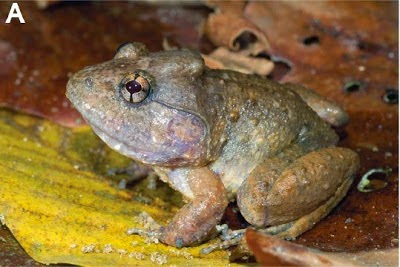Treefrogs of the genus Boophis
are found in Madagascar and the Comoros Islands, reaching maximum diversity in
the rainforests of eastern Madagascar. There are over 70 species in the genus,
most of them being fairly recent discoveries. The genus is split into two
subgenera, Boophis, which breeds in
streams, and Sahona, which breeds in
ponds. The majority of species in the genus are placed within the subgenus Boophis, and there has been some effort
to further subdivide this, though there is disagreement about how this should
be done.
In a paper published in the journal ZooKeys on 18 August 2014, a
team of scientists led by Samuel Penny of the School of Biological Sciences at
the University of Bristol and the Bristol Zoological Society describe a new
species of Boophis from the
Sahamalaza – Iles Radama National Park on the Sahamalaza Peninsula in northwest
Madagascar.
The new species is assigned to the subgenus Boophis and given the specific name ankarafensis, meaning ‘from Ankarafa’, in reference to the Ankarafa
Forest, where it was found. The species is described from three male and one
female specimens, collected in transitional forest at altitudes of 130-140 m in
November and January. The males range from 22.9 to 24.0 mm in length while the
female is 28.5 mm long (female Frogs are usually larger than males of the same
species). The species is greenish in colour and translucent, with red and
yellow spots on its dorsal surface.
Boophis (Boophis) ankarafensis, male and female specimens
in amplexus (mating position). Penny et
al. (2014).
The species has a distinctive call, which was used to search for
further specimens, in order to map the distribution of the species. A total of
56 Frogs were found, including 48 males and 8 females. All were found in a very
small geographical area, in small forest fragment, the Ankarafa Forest, close
to two streams. The species could not be found in other habitats on the Sahamalaza
Peninsula, notably being absent from the Anabohazo Forest (the only other piece
of forest on the peninsula) or the swampland downstream of the Ankarafa Forest.
Since the Ankarafa Forest only covers an area of about 5 km2, and is
considered to be at risk from slash and burn agriculture, unregulated
small-scale logging and fires on the surrounding grasslands, the species is considered
to be Critically Endangered under the terms of the International Union for the Conservation of Nature’s Red List of Threatened Species.
Habitat of Boophis (Boophis) ankarafensis in Ankarafa Forest. Penny et al. (2014).
See also…
Fanged Frogs of the genus Limnonectesget their name from fang-like protrusions on the jaws of the male Frogs. They
are unusual for Frogs in that the males are larger than the females (the
reverse is usually the case), and apparently defend territories through
physical contests with other males, with females mating with the...
Fanged Frogs of the genus Limnonectesare found across southern China and Japan, as well as the Philippines,
Southeast Asia and much of Indonesia. They are unusual in that the males are
considerably...
Cryptic species are species that closely resemble other species, and
cannot be separated by simple, non-invasive examination. While taxonomists have
known about cryptic species for a long time, it was not...
Follow Sciency Thoughts on Facebook.





